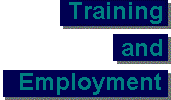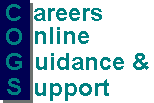Some employers nowadays use a variety of selection techniques to help them find " the best person" for their job; this does not mean the person with the greatest number of qualifications. The employer is looking for the right combination of qualities; personality, ability, experience, qualifications and potential.
Selection techniques include
- Extended Assessment or Assessment Centres
- Psychometric tests
- Occupational Personality Questionnaires (OPQs)
Interviews - some do's and don'ts
Do
- research about the company before the interview. It enables you to emphasise positive qualities about yourself and gives confidence to answer questions at interview.
- check the interview route and allow ample travel time; arrive at least 15 minutes early
- know the details of your own job application
- prepare your answers to questions you might anticipate
- prepare one or two particular questions you would like to ask, normally at the end of the interview
- dress for the occasion; be smart and comfortable. An interview is not a fashion show and an inappropriate appearance can portray the wrong image
- remember to take any certificates or documents if requested
- at the interview, shake hands with the interviewers. Speak clearly, ask questions, smile from time to time (you'll get a smile back and that helps the nerves!), sit comfortably. Sell yourself.
Don't
- tell untruths or bluff
- answer just yes or no
- smoke
- interrupt
- give negative body language message like twiddling hair, repeatedly adjusting a tie, clenching fists etc.
- use first names unless invited to do so.
Types of interview
Selection interviews can take many forms.
- single interviews involve a "one to one" interview; applicant and employer
- series interviews involve a multi-round of interviews, i.e first interview with the Personnel Officer; second interview with the Line manager; and third with the Departmental Head
- panel interviews are the most common type where the applicant is interviewed by a collective number of interviewers (the panel).
- group interviews are situations where the applicants are assembled as a group and expected to interact (say in a group discussion) whilst being observed by 'interviewers'
Extended Assessment or Assessment Centres
This involves the use of other selection techniques and usually an interview too. Extended Assessments are also known as Assessment Centres; they are normally reserved for more senior level recruitment and selection. Each one takes up to a day to complete.
Assessment Centres are quite often used for 'trainee' selection e.g. sponsorship schemes or for apprentice selection. They are usually held on the employer's premises and involve a group of job applicants, normally 6-10, who take part in a selection of carefully prepared exercises. The purpose of the Assessment Centre is to build up a picture of each candidate in a way an interview alone could not.
Exercises may include
- taking part in business games
- giving a presentation
- simulations of job routine (e.g. in-tray exercises)
- written reports
- group activities (e.g. discussions)
Psychometric tests
These are designed to measure any of a range of personal attributes; verbal reasoning ability (understanding of words and phrases); numerical reasoning (the ability to interpret and calculate numbers); mechanical comprehension; spatial reasoning and many others. Psychometric tests measure a person's ability to understand or do something.
Employers are increasingly incorporating psychometric (or aptitude) tests into their assessment and selection procedures. Evidence suggests that these tests can provide reliable information about the likelihood of a persons success in a job.
What do the tests involve ?
Normally they are pencil and paper tests that involve a number of multiple-choice question and answers. A candidate marks the answer sheet by indicating which one of a number of possible answers is correct. These tests are strictly timed and can be between 10 and 40 minutes in length. They require candidates to work quickly and accurately without wild guessing.
Occupational Personality Questionnaires (OPQs)
OPQs are a pencil and paper exercise but are not a test. The response a candidate gives has no right or wrong answer. The candidate is presented with a list of statements (normally in excess of 200) and is required to indicate what they feel to be their answer.
|
Example: "I enjoy mending things" |
strongly
agree | disagree | agree | unsure | disagree
strongly |
| 1 | 2 | 3 | 4 | 5 |
| (circle a number 1-5) |
From the responses given to questions an employer can establish a personality profile of each candidate that provides a measure of the different characteristics of an individual.






